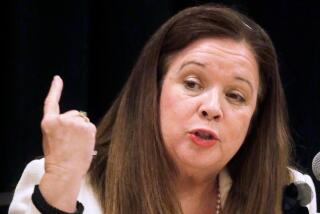Weiss says Trutanich would bring conflicts of interest to city attorney’s office
- Share via
In his campaign for Los Angeles city attorney, Westside Councilman Jack Weiss says that taxpayers could be forced to pay thousands of dollars in legal fees if they elect his opponent, defense lawyer Carmen Trutanich, who has spent two decades representing private clients.
If the city becomes engaged in a lawsuit involving one of Trutanich’s former clients, Weiss has argued, the potential conflict of interest might require his office to hire costly outside counsel, and for that reason Weiss has repeatedly called on Trutanich to disclose his clients.
Trutanich has denied that it would be a significant problem, saying he would find other government attorneys to handle the work. He has invited voters to view public records of his firm’s cases, but for those who have not appeared in court, the privilege of disclosure belongs to the clients, he has said.
Weiss, backed Monday by several former presidents of the city’s Ethics Commission, highlighted a California Supreme Court ruling in which the entire San Francisco city attorney’s office was disqualified from handling a case against a technology company because City Atty. Dennis Herrera had advised the firm as their private attorney just prior to taking office.
Several legal ethicists agreed that the 2006 ruling could present problems for any private attorney seeking the city attorney’s office, but they noted that the disqualification of Herrera’s entire office stemmed from narrow circumstances.
Deborah L. Rhode, director of Stanford University’s Center on the Legal Profession, said the ruling’s impact should not be exaggerated. While a case could arise that would force the city attorney’s office to hire outside counsel, she said, “It’s just not at all clear how many clients would be affected and how much of an additional fiscal burden it would be on the city.”
Trutanich’s campaign consultant, John Shallman, characterized Weiss’ argument as “absurd” and said his threats of wholesale recusals amount to “reckless fear-mongering.” The San Pedro attorney has said that if elected he would recuse himself from two pending city cases.
Trutanich supporter William Carter, a former state and federal environmental crimes prosecutor, said Weiss’ argument could easily be turned on the councilman. For nine months starting in 1993, Weiss worked for the prominent Southern California law firm of Irell & Manella, which represented two billboard companies in a settlement with the city more than a decade later that allowed them to convert more than 800 signs to a digital format.
“He will have to disclose any and all clients that were represented by Irell & Manella when he was there,” Carter said.
Weiss’ campaign Monday said that he did not handle any work for those billboard companies and that he would disclose a list of clients this week.
David Pasternak, a Weiss supporter and former president of the Los Angeles County Bar Assn., said the San Francisco ruling makes it imperative for Trutanich to disclose his clients “so that voters like me can determine whether the city attorney’s office is going to be conflicted out of many cases in the future.”
The case Weiss is citing involved a firm, Cobra Solutions, that had a contract with the city of San Francisco to offer technology services. The company hired Herrera’s law firm for advice on city contracts.
When he was elected city attorney, Herrera pledged to remove himself from matters that touched his firm. But the city was investigating a kickback scheme involving an employee accused of taking payments from computer service providers, and Cobra Solutions was ultimately implicated.
One of the allegations included breach of contract, so the company sought to disqualify Herrera and his entire office -- citing a bill showing that Herrera reviewed a contract document related to the case for 24 minutes.
The trial court granted the request to disqualify the office, finding that while personally representing the client Herrera had gained confidential information on “matters related substantially to the issues raised against the defendants in this litigation.”
In the majority opinion of the California Supreme Court that upheld the ruling, justices cited the lower court’s finding that deputies serve at the pleasure of the city attorney.
Loyola law professor Paul T. Hayden said that under certain circumstances an ethical screening process could shield whoever is elected city attorney from being disqualified from cases involving prior clients.
Hayden said he did not expect that Trutanich “or everyone in the office would be disqualified from every case involving a former client of his law firm.”
Carter characterized the Herrera case as “very fact-specific” and noted the statute of limitations on prosecuting misdemeanors and civil cases. “The odds of a conflict are almost nil,” he said.
--
More to Read
Sign up for Essential California
The most important California stories and recommendations in your inbox every morning.
You may occasionally receive promotional content from the Los Angeles Times.














